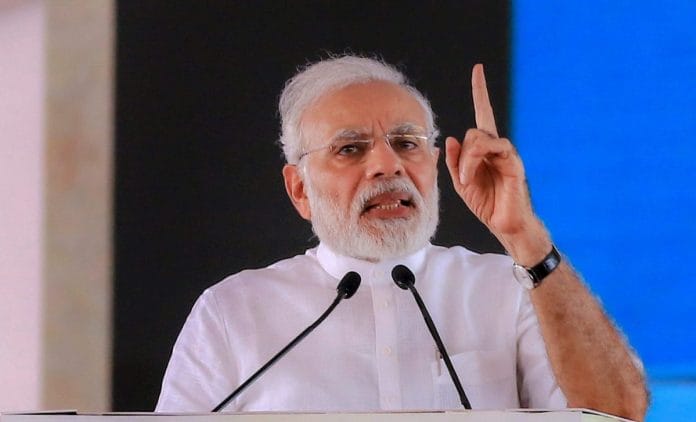The law may ensure that the BJP can’t split PDP MLAs and form its own government in Jammu and Kashmir.
The rumour mill is spinning again, with speculation mounting that the BJP is trying to break its former ally PDP to form a government in Jammu and Kashmir, with Sajjad Lone’s People’s Conference party also part of it.
Several reports suggest that after failing to control the narrative in alliance with the PDP, the BJP now wants to install a Hindu chief minister in Muslim-majority J&K – possibly Jitendra Singh, the union minister of state in the Prime Minister’s Office and the BJP Lok Sabha MP from Udhampur-Doda.
For this, the BJP needs the support of 44 MLAs in the 87-member J&K assembly, but it only has 25 of its own, while Lone’s party has two. Pawan Gupta, an independent MLA from Udhampur whose father was a former BJP leader, is also set to support the national party. But all this merely takes the BJP’s numbers to 28 – 16 short of the majority mark.
The BJP is going all out to woo disgruntled PDP MLAs, since it believes such a step will also help its cause in next year’s Lok Sabha elections. But the MLAs are also said to be simultaneously in touch with the Congress and the PDP’s chief rival in the Valley, Omar Abdullah’s National Conference.
Breaking the PDP will be easier said than done, even for a party like the BJP, with its deep pockets. Unlike the rest of the country, J&K has a very stringent anti-defection law that allows very little room for a party to be split.
Anti-defection law in the rest of India
The 52nd amendment to the Constitution, which added the Tenth Schedule in 1985, provides that legislators (MPs or MLAs) can be disqualified on grounds of defection if they voluntarily give up membership of their party or disobey the whip of the party leadership during a vote.
However, after the 91st Constitutional Amendment Act, 2003, if at least two-thirds of the legislators of a party defect to voluntarily merge into another party, they won’t attract the provisions of the Tenth Schedule.
After the 2003 amendment, a split in the legislature party is no longer allowed.
In case of a defection, the leader of the party can move an application to the Chairman or the Speaker of the house, seeking the disqualification of the MP or MLA.
The decision of the presiding officer, while open to judicial scrutiny, is deemed to be final.
The J&K law
The anti-defection law in J&K, passed when the PDP-Congress coalition was ruling the state in 2005, states that even if every single MLA defies the party whip, they are all liable to be disqualified.
Through an amendment passed by the J&K Assembly, Para 3 of Schedule 7 of the Jammu and Kashmir Constitution – which allowed one-third of a party’s MLAs to form a separate, recognised group – was deleted.
No matter their number, if MLAs elected on a particular party’s symbol decide to part ways – whether to join another party or float their own – they have to resign and seek re-election.
More importantly, unlike the rest of the country, in J&K, the issue of disqualification of defecting MLAs is referred to the leader of their own legislature party, whose decision is deemed to be final.
In the present scenario, even if the reports are true that 11 of the PDP’s 28 MLAs are planning to defect, it will be Mehbooba Mufti who decides on their fate, and not the Speaker.
Why the BJP is desperate
Since it joined hands with the PDP to form the government in J&K, the BJP has lost a lot of political capital. Having almost swept the entire Hindu belt in the Jammu region, the non-performing BJP ministers and largely absent MLAs have robbed the party of the golden opportunity to capitalise on the results of the 2014 polls.
The party’s votebank is unhappy, while the swing vote is showing signs of returning to the Congress fold. Increasing incidents of militancy and cross-border shelling have added to the party’s woes, leaving it no option but to break ties with the PDP and try to take the high moral ground.
The only problem with the party’s carefully orchestrated plan was that Jammuites are still refusing to forgive or forget the last three-plus years of misrule, which also saw the party ministers happily play handmaidens to the PDP leadership.
In attempting to give the state a Hindu CM, the BJP hopes it will be able to win back not just the Hindus of Jammu, but also send out a message to its core votebank in the rest of the country. But the stringent anti-defection law in the state will play spoiler.







J & K’s principled – rather than calling it stringent – anti defection law is worthy of adoption for the rest of the country. Speakers have almost invariably abused the discretion vested in them. This draws in the judiciary to adjudicate and ensure justice, blurring the separation of powers. 2. Given the circumstances leading up to Governor’s Rule, forming a government through means that would be considered par for the course in other states would not be in the national interest. For the state, India’s troubled crown jewel, to have a Hindu CM would be deeply problematic, provicative. 3. With his long tenure and deep knowledge of the affairs of the state, Governor Vohra should hold the fort till some sort of normalcy, with utmost restraint in the use of force, can be restored, preparing the state to participate in the next general election, which looks difficult in the present circumstances. 4. Why its ministers have been such a disappountment, causing serious erosion of support and goodwill in barely three years, is so ething for the party to analyse. By no means confined to one state.